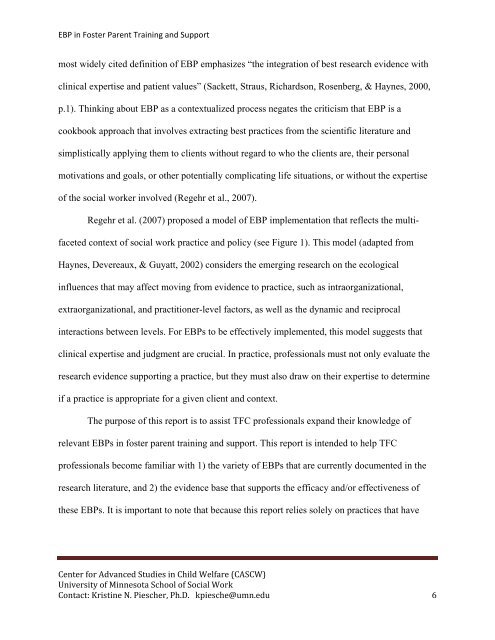Evidence-Based Practice in Foster Parent Training and Support ...
Evidence-Based Practice in Foster Parent Training and Support ...
Evidence-Based Practice in Foster Parent Training and Support ...
Create successful ePaper yourself
Turn your PDF publications into a flip-book with our unique Google optimized e-Paper software.
EBP <strong>in</strong> <strong>Foster</strong> <strong>Parent</strong> Tra<strong>in</strong><strong>in</strong>g <strong>and</strong> <strong>Support</strong>most widely cited def<strong>in</strong>ition of EBP emphasizes “the <strong>in</strong>tegration of best research evidence withcl<strong>in</strong>ical expertise <strong>and</strong> patient values” (Sackett, Straus, Richardson, Rosenberg, & Haynes, 2000,p.1). Th<strong>in</strong>k<strong>in</strong>g about EBP as a contextualized process negates the criticism that EBP is acookbook approach that <strong>in</strong>volves extract<strong>in</strong>g best practices from the scientific literature <strong>and</strong>simplistically apply<strong>in</strong>g them to clients without regard to who the clients are, their personalmotivations <strong>and</strong> goals, or other potentially complicat<strong>in</strong>g life situations, or without the expertiseof the social worker <strong>in</strong>volved (Regehr et al., 2007).Regehr et al. (2007) proposed a model of EBP implementation that reflects the multifacetedcontext of social work practice <strong>and</strong> policy (see Figure 1). This model (adapted fromHaynes, Devereaux, & Guyatt, 2002) considers the emerg<strong>in</strong>g research on the ecological<strong>in</strong>fluences that may affect mov<strong>in</strong>g from evidence to practice, such as <strong>in</strong>traorganizational,extraorganizational, <strong>and</strong> practitioner-level factors, as well as the dynamic <strong>and</strong> reciprocal<strong>in</strong>teractions between levels. For EBPs to be effectively implemented, this model suggests thatcl<strong>in</strong>ical expertise <strong>and</strong> judgment are crucial. In practice, professionals must not only evaluate theresearch evidence support<strong>in</strong>g a practice, but they must also draw on their expertise to determ<strong>in</strong>eif a practice is appropriate for a given client <strong>and</strong> context.The purpose of this report is to assist TFC professionals exp<strong>and</strong> their knowledge ofrelevant EBPs <strong>in</strong> foster parent tra<strong>in</strong><strong>in</strong>g <strong>and</strong> support. This report is <strong>in</strong>tended to help TFCprofessionals become familiar with 1) the variety of EBPs that are currently documented <strong>in</strong> theresearch literature, <strong>and</strong> 2) the evidence base that supports the efficacy <strong>and</strong>/or effectiveness ofthese EBPs. It is important to note that because this report relies solely on practices that haveCenter for Advanced Studies <strong>in</strong> Child Welfare (CASCW)University of M<strong>in</strong>nesota School of Social WorkContact: Krist<strong>in</strong>e N. Piescher, Ph.D. kpiesche@umn.edu 6
















